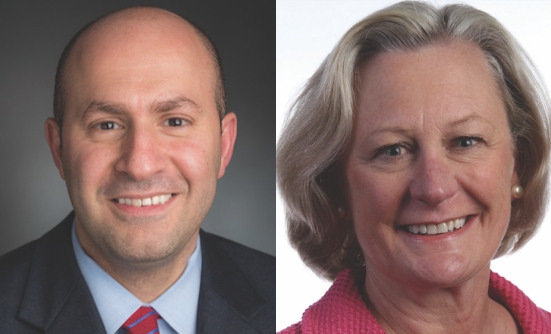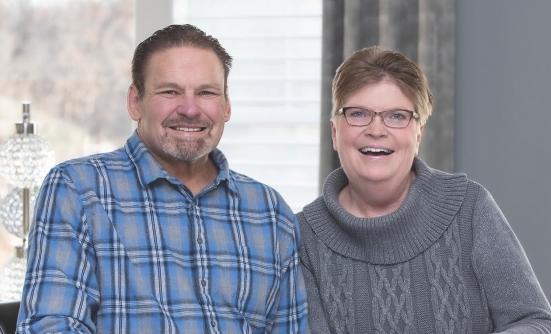
Facing a cancer diagnosis can be scary. As a patient or a caregiver, you will experience many emotions from the time you first hear the diagnosis. It is important for you to realize that these feelings are normal. Remember that you have control of this journey, and there is a large network of support available to you. In writing this “Guide to Kidney Cancer for Survivors and Caregivers,” I hope to make your experience a little less scary by giving you an overview of kidney cancer, a review of treatment options, and encouragement to take control of controllable factors.
Statistics
To begin, I’d like to review a few kidney cancer statistics. Kidney cancer is among the 10 most common cancers, and it is estimated that nearly 74,000 people in the United States will be diagnosed with it in 2020.1 Five-year survival rates can be as high as 93%. The average age at diagnosis is 64 years, and it is more common in African Americans and American Indian/Alaska Natives, and twice as common in men.1 There are many different types of kidney cancer, with the most common being renal-cell carcinoma. Renal-cell carcinoma is classified as either clear-cell carcinoma or non–clear-cell carcinoma based on how the cancer cells look under a microscope.
Treatment
There are 2 ways to treat kidney cancer: with local therapy or with systemic treatments. You can use one or both depending on the type, location, and size of the cancer.
Local Therapies
Local therapies treat the tumor only and do not impact the rest of the body. Examples of local therapies include surgery, radiation, and ablation.1
- Surgery is used to remove any bulky disease or tumor that is visible to the eye. A surgeon will remove all visible tumor(s) as well as lymph nodes that may be affected. Despite removing all large visible tumors, residual microscopic disease may still remain. This is cancer that cannot be seen and may only be evident on the pathology reports
- Radiation therapy uses high-energy beams that kill cancer cells, but they can also cause damage to healthy tissue. Radiation can be used in combination with surgery, or if someone is not healthy enough for other treatments. When thinking about how surgery and radiation work together, think of surgery as a broom. It will remove as much of the big debris as you can see but often leaves dust particles behind. Radiation is the mop that will help clean up all the tiny particles we cannot see
- Ablation is typically used for small cancers, or in people who are not candidates for surgery, and uses either extreme cold (cryotherapy) or radio waves to destroy the tumor.
Systemic Treatment
Using the same analogy as above, you can think of systemic treatment as a mop used to reach the whole body to treat any microscopic disease that may have spread to other areas.
Systemic treatments can be given both intravenously (through a vein) or by mouth in a pill. They can be given alone, or you might receive a combination of drugs. We used to call systemic treatment chemotherapy, but it now includes many other types of treatments, such as targeted therapies and immunotherapy.
Traditional chemotherapies prevent the tumor cell from growing or replicating by breaking the cell’s growth cycle. However, these drugs can impact healthy cells as well. Examples of chemotherapy include 5-FU, capecitabine, and gemcitabine2; however, they are not standard first-line therapy and are typically used only after targeted therapies or immunotherapies have been used.1,2
Targeted therapies are used to block very specific proteins and/or functions in the cell and can be given intravenously or by mouth. The most commonly used drugs for kidney cancer are called tyrosine kinase inhibitors.2 There are many different types of tyrosine kinases that work in different ways and target different functions of the cancer cell, such as vascular endothelial growth factor (VEGF), endothelial growth factor receptor (EGFR),3,4 and mammalian target of rapamycin (mTOR).
- VEGF tells new blood vessels to grow into the tumor cell, feeding it. Inhibitors of VEGF will starve the cancer cell of needed blood supply and include axitinib (Inlyta) and bevacizumab (Avastin)2,4
- Multikinase inhibitors block VEGF and other pathways and include cabozantinib (Cabometyx), pazopanib (Votrient), lenvatinib (Lenvima), sorafenib (Nexavar), and sunitinib (Sutent)4
- EGFR tells the cancer cells to grow and replicate to make more cells. Inhibitors will prevent cell growth and replication and include erlotinib (Tarceva)2,4
- mTOR also tells the cancer cells to grow and divide. An mTOR inhibitor stops the cancer cell from receiving the signal slowing tumor growth and includes everolimus (Afinitor) and temsirolimus (Torisel)5
Immunotherapy drugs help your body’s own immune system. They work by making the cancer cells more visible to, boosting, or restoring your immune system.1 Cancer cells can escape detection from the body’s immune system in a variety of ways. PD-L1 is a protein that normally functions to prevent the immune system from attacking healthy cells in the body. Some cancer cells will use PD-L1 to hide from the immune system.5 Drugs such as nivolumab (Opdivo) and pembrolizumab (Keytruda) will block the protein, allowing the immune system to find, or “unmask,” and destroy the cancer cells.5 CTLA-4 is another protein that will put the brakes on your immune system to prevent it from attacking the cancer cells. Drugs such as ipilimumab (Yervoy) will block this protein and improve your immune system’s ability to attack the cancer cells. Your provider may use a combination of drugs from different classes to attack the cancer from multiple paths.
Dosing
Dosing of all drugs is done in cycles. A cycle is completion of 1 or more days of your treatment. Some drugs are given intravenously over 1 day every 7 to 21 days, some will be given over 3 days, and some are pills that you take for a period of time followed by a break period. For example, Sutent might be prescribed to be taken once a day for 4 weeks, followed by a 2-week break. This 6-week period is known as 1 cycle. You will be treated with a certain number of cycles. Your doctor will select a dosage that they think is appropriate for you based on factors such as your height, weight, nutrition status, and overall health. During your treatment they may choose to change the dose because you become too sick, experience side effects, or because the tumor is not responding. They may also decide to change your therapy to a different drug or drugs. If this happens, do not get discouraged. There are other options available to treat the cancer.
Side Effects
It is important to take your medications as prescribed and keep an open dialogue with your healthcare team about any problems you may be having with taking your medications or any side effects you are experiencing. It is very important to tell your healthcare team about any and all side effects as early as possible. Each drug will have its own common side effects that your healthcare team will review with you.
If you report side effects early, they can be managed, and you may be able to stay on your treatment. Sometimes you may need a treatment break, a dosage change, or change in drug. Often your doctor can prescribe supportive care medications to manage these side effects and help get you through your treatment. Your provider wants to find the best treatment for you that will provide not only quantity but quality of life. My advice to you: Don’t hide symptoms. Admit when something is wrong. Your entire team wants the best for you.
Take Control!
There are several things you have total control over when facing a cancer diagnosis. The most important is your choice of cancer care team. You want to make sure you select someone you feel comfortable with and who can provide the quality care you deserve. You will receive advice from family, friends, and coworkers, all of whom want the best for you, but only you can make this decision. It’s okay to seek a second or third opinion. Getting treated early is important, but take the time to find the right team. Remember that you will be spending a lot of time with these providers and their staff.
Keep a diary. Make sure to keep track of any questions you may have for your care team, and then record their answers. Keep track of your side effects. You may notice a specific pattern of days when you feel better than on other days. It will also help you remember to discuss them with your provider at your next visit. Use it to express how you feel today. Writing things down or keeping electronic records can help you manage everything about your cancer care and help you to express your emotions.
Use the resources available to you. If you have any concerns or questions about anything that may be a barrier to receiving treatment, reach out to a member of the care team, like your navigator or social worker. They can help you with many things, such as childcare, transportation, and financial and housing assistance. They may also have partnerships with attorneys who can help with legal issues. You can also talk to your navigator to request additional services, such as psychology and pastoral care, if you are struggling. Do not let something stand in your way of getting treated.
Be your own advocate. Your treatment should be a shared decision between you and your physician. They should provide you with all of your options so you can pick what works best for you. You are also in control of deciding when to stop treatment. Make sure you tell your care team when you are experiencing side effects, or anything you think may be affecting your treatment, early and often.
Taking Care of Yourself
When it comes to taking good care of yourself, your healthcare team will have multiple resources for you. There are many specialists who focus on caring for patients with cancer, such as physical therapists, psychologists, nutritionists, social workers, and pain management and supportive care physicians. If you think you need assistance, speak up and ask for help.
Side effects of treatment can impact your daily life and sometimes be debilitating. But there are many things you can do to help manage those side effects. Diet modifications, such as consuming bananas, rice, apples, yogurt, and probiotics, will help diarrhea.3,4 To prevent fatigue, maintain adequate hydration, exercise as much as you can tolerate, take frequent rest periods, and make sure you have good sleep habits.3,4,6 Using sunscreen, emollient creams, and tepid showers can prevent or improve skin reactions.3,4,7 Proper oral care, including use of a soft toothbrush, salt and baking soda mouth washes, cryotherapy, and avoiding irritating substances will help treat oral ulcers and irritation.3,4,7
Communicate with your loved ones. It might be a good idea to create a phone tree for communication with your family members. When you are in the hospital or perhaps during treatment, you may not feel up to talking to the multiple people who care about you. Choose 1 person to be your primary contact and the 1 person who will call the hospital. That person will call the next one, and so on. This way everyone stays informed, but it does not emotionally drain you while undergoing treatment. Turn off your phone when you feel tired, and even consider setting boundaries for visiting hours.7 Use your journal to help you decide which days are best to have visitors. It is OK to say no, or that you would prefer the visit on another day. Just like it is important to know when to ask for help, it is also important to know when to say no.7
Consider joining a support group. There are many in-person and virtual support groups available. There are also many apps you can use that will provide support, and also allow for organization of daily activities, rides, etc.
Prioritize tasks.6,8 You may still want to do as much as possible during your treatment, such as continuing to work, complete household chores, and caring for your children. But you may not be able to do it all. Make sure you prioritize the tasks that are most important to you and your family, and then ask for help from friends and extended family for the remaining items.
Do the things you enjoy.8 Talk to your provider about what activities and events you can safely continue to participate in. Whether it is attending church, going for nature walks, or going to the movies, take the time to do them. You will not regret it.
Yes, facing a cancer diagnosis can be scary. I hope that as you learn more about kidney cancer, treatments for the disease, possible side effects of those treatments, and your role as a participant on the care team, you will discover a sense of empowerment. Through knowledge, communication, and selfcare, you have control of this journey, and there is a large network of support available to you. Just reach out and grab it.
Caregivers' Corner
As a caregiver, you are the person who most often helps your loved one who has been diagnosed with cancer.6 Whether you are a spouse, child, family member, close friend, neighbor, or fellow parishioner of the cancer survivor, you may find yourself helping with transportation, feeding, dressing, day-to-day tasks, and financial or legal concerns. You are also an important part of the cancer care team and often help to report side effects, give drugs, assist with medications, and help decide on treatments.
With your newfound role, it is common to experience stress, compassion fatigue, and burnout.6,7 As you know, caregiving can sometimes consume 24 hours a day, leading to fatigue and sleep deprivation. Lack of sleep can cause anxiety, irritability, anger, impact concentration, judgment, job performance, and task performance.6
There are many ways you can combat caregiver fatigue. I’ll outline several ideas for your consideration below:
- Engage other family members or services to help provide respite periods
- Know your limitations and request services from the patient’s navigator or social work team to help, including visiting nurses or home care aides where possible6
- Request family and community members to assist with transportation or meals
- Get your sleep
- Avoid alcohol, caffeine, foods high in fat, large meals, and consumption of liquids close to bedtime6,7
- Eat a well-balanced diet high in protein and fresh produce, and maintain adequate hydration throughout the day6,7
- Exercise regularly and try to maintain a schedule when possible
- Use sound machines, apps, or websites to listen to relaxing sounds or music before sleep, and avoid watching television or using electronic devices before bed7
- Try meditation, prayer, or deep breathing exercises
- Record your daily activities and sleep habits to try to identify areas where you can change and make improvements
- Ask for help from family members to take your loved one to appointments or to stay with them for a few hours so you can do your own tasks and nap when needed.
Consider applying for the Family Medical Leave Act (FMLA) to maintain employment status. You may need to take time off from work, and you worry that will impact your employment. The FMLA guarantees up to 12 weeks off in a year either intermittently or sequentially to help care for a family member with a serious illness.7 Discuss with your human resources department if you qualify, or if they have any other employee assistance programs.
A common concern I hear from caregivers is frustration—you may feel frustrated if your loved one will not care for themselves or seems to have given up. Be sure to discuss with their healthcare team if there is a sudden change in their self-care abilities to rule out any possible medical reason. Otherwise, it is important to encourage the person undergoing treatment to do as much as possible. Allow them to make decisions by providing choices such as “would you rather have fish or chicken for dinner.”7 Discuss with them the importance of participating in their care as much as possible, meaning, they should engage with their healthcare team, participate in treatment decisions, and report side effects early and often.
Finally, I’d like to remind you to get your cancer screening tests done!7 While caring for a loved one, it can be easy to forget about yourself. Make sure you are taking your medications properly, continue to see your primary care provider, and get all of your cancer screenings done in a timely manner.
References
- American Cancer Society. Kidney Cancer. www.cancer.org/cancer/kidney-cancer.html. Accessed September 25, 2020.
- American Society of Clinical Oncology. Cancer.Net. Kidney Cancer. www.cancer.net/cancer-types/kidney-cancer/types-treatment. 2019. Accessed September 25, 2020.
- Esper P. Identifying strategies to optimize care with oral cancer therapy. Clin J Oncol Nurs. 2013;17:629-636.
- Wood LS. Management of vascular endothelial growth factor and multikinase inhibitor side effects. Clin J Oncol Nurs. 2009;13(suppl):13-18.
- National Comprehensive Cancer Network. NCCN Guidelines for Patients. Kidney Cancer. www.nccn.org/patients/guidelines/content/PDF/kidney-patient.pdf. 2020. Accessed September 28, 2020.
- Fox Chase Cancer Center. 5 Keys to Self-Care During Cancer Treatment. www.foxchase.org/blog/5-keys-self-care-during-cancer-treatment. Published February 20, 2019. Accessed September 21, 2020.
- American Cancer Society. Caregiver Resource Guide. Caring for a loved one with cancer. www.cancer.org/content/dam/cancer-org/cancer-control/en/booklets-flyers/american-cancer-society-caregiver-resource-guide.pdf. Published February 2, 2019. Accessed September 28, 2020.
- Dwyer K. Fighting Caregiver Fatigue. Today’s Caregiver. https://caregiver.com/articles/fighting_caregiver_fatigue. Published May 11, 2017. Accessed September 21, 2020.
Patient Resources
American Cancer Society
cancer.org
www.cancer.org/content/dam/cancer-org/cancer-control/en/booklets-flyers/american-cancer-society-caregiver-resource-guide.pdf
Patient and caregiver resources, financial assistance, wellness programs
National Comprehensive Cancer Network
nccn.org/patients
www.nccn.org/patients/guidelines/content/PDF/kidney-patient.pdf
Patient and caregiver resources, treatment guidelines, clinical trials
National Cancer Institute
Cancer.gov
Clinical trial information, cancer diagnosis and treatment
Kidney Cancer Association
kidneycancer.org
Drug information, financial assistance, navigation















